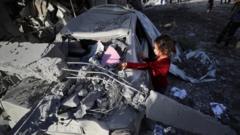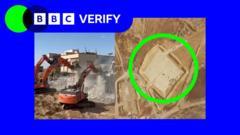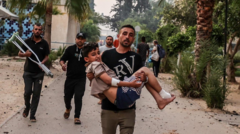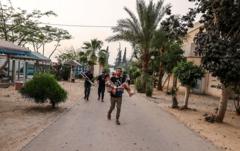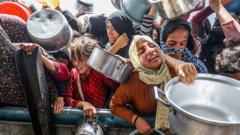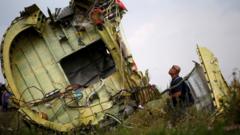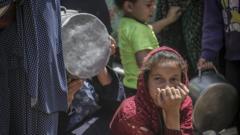As the war intensifies, the evacuation raises serious concerns over civilian safety and the humanitarian situation in the region.
**Israel Orders Comprehensive Evacuation of Gaza City Amid Escalating Conflict**
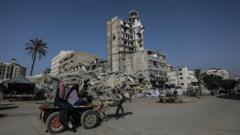
**Israel Orders Comprehensive Evacuation of Gaza City Amid Escalating Conflict**
Amidst escalating military operations, Israel issues a sweeping evacuation order for Palestinians in Gaza City, declaring it unsafe.
Israel has formally announced one of the most extensive evacuation orders for Palestinians in Gaza amidst its ongoing military operations. The Israel Defense Forces (IDF) have deemed large areas of Gaza City unsafe, including locations that have become temporary shelters for thousands of displaced individuals. Residents are urged to evacuate before anticipated "intense strikes," targeting sites such as the Islamic University, Al-Shifa Hospital, and several previously functioning schools, which Israeli authorities allege are being utilized by Hamas for military operations.
Despite the Israeli government's claims, humanitarian organizations assert that the area is densely populated with civilians seeking refuge. The implications of such an extensive evacuation order could lead to significant civilian casualties, especially considering the limited time available for safe relocation. The urgency of these measures indicates a potential escalation in Israel's military strategy in Gaza, raising alarm among local authorities and international observers.
Former Prime Minister Ehud Olmert has emerged as a vocal critic of the current military campaign, suggesting that a sizable portion of Israeli society and military leaders oppose its expansion. He has called for an immediate cessation of hostilities, emphasizing the urgent humanitarian needs of the Gazan population. Olmert’s remarks reflect rising dissent within Israel regarding the moral and humanitarian ramifications of prolonged military action.
The humanitarian crisis in Gaza is dire, exacerbated by a 10-week blockade that has restricted essential supplies such as food and medicine. United Nations assessments indicate that over two million Palestinians are at severe risk of famine. While Israeli officials attribute hunger in Gaza to Hamas’s actions, the broader international community, including leaders like French President Emmanuel Macron, has criticized the country’s military approach as exacerbating the humanitarian situation.
Military actions resumed on March 18, resulting in substantial casualties, with the latest reports indicating nearly 3,000 deaths in Gaza. In light of the growing call for ceasefire negotiations, some former hostages have issued letters urging for peace talks, emphasizing societal support for the safe return of captives over continuation of the conflict.
Despite potential diplomatic developments that could foster a ceasefire, Prime Minister Netanyahu remains adamant that military operations will continue unabated until Hamas is effectively dismantled. This uncompromising stance follows a major attack on October 7, which marked the onset of the current escalation, resulting in significant loss of life on both sides. As the conflict persists, the attention shifts towards finding avenues for peace amid a complex and deteriorating humanitarian landscape in Gaza.
Despite the Israeli government's claims, humanitarian organizations assert that the area is densely populated with civilians seeking refuge. The implications of such an extensive evacuation order could lead to significant civilian casualties, especially considering the limited time available for safe relocation. The urgency of these measures indicates a potential escalation in Israel's military strategy in Gaza, raising alarm among local authorities and international observers.
Former Prime Minister Ehud Olmert has emerged as a vocal critic of the current military campaign, suggesting that a sizable portion of Israeli society and military leaders oppose its expansion. He has called for an immediate cessation of hostilities, emphasizing the urgent humanitarian needs of the Gazan population. Olmert’s remarks reflect rising dissent within Israel regarding the moral and humanitarian ramifications of prolonged military action.
The humanitarian crisis in Gaza is dire, exacerbated by a 10-week blockade that has restricted essential supplies such as food and medicine. United Nations assessments indicate that over two million Palestinians are at severe risk of famine. While Israeli officials attribute hunger in Gaza to Hamas’s actions, the broader international community, including leaders like French President Emmanuel Macron, has criticized the country’s military approach as exacerbating the humanitarian situation.
Military actions resumed on March 18, resulting in substantial casualties, with the latest reports indicating nearly 3,000 deaths in Gaza. In light of the growing call for ceasefire negotiations, some former hostages have issued letters urging for peace talks, emphasizing societal support for the safe return of captives over continuation of the conflict.
Despite potential diplomatic developments that could foster a ceasefire, Prime Minister Netanyahu remains adamant that military operations will continue unabated until Hamas is effectively dismantled. This uncompromising stance follows a major attack on October 7, which marked the onset of the current escalation, resulting in significant loss of life on both sides. As the conflict persists, the attention shifts towards finding avenues for peace amid a complex and deteriorating humanitarian landscape in Gaza.



